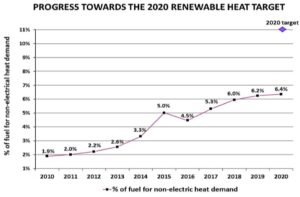Agribusiness News September 2023 – Input Costs: Alternative Energy
1 September 2023Turning up the heat
Scotland has made significant progress over recent years to increase its renewable output, with renewable electricity generation equivalent to approximately 97% of Scotland’s gross electricity consumption. However, decarbonising our heat sector has been more of a challenge, with key targets missed. See below graph from Scottish Renewables.

Providing more sustainable options to meet our heat demand is essential to meet our climate change targets. It is estimated that 20% of Scotland’s carbon emissions are as a result of heating buildings.
The Scottish Government is implementing policies and proposals to help accelerate this. Scotland’s Energy Strategy and Just Transition Plan aims that by 2030, Scotland’s main energy using sectors, including heat in buildings, transport, industry and agriculture, will be using energy more efficiently and be largely decarbonised. New buildings will not be able to have gas boilers from April 2024 and a current consultation on Energy Performance Certificate (EPC) reform is seeking views ahead of the introduction of new legislation. You can find more on this consultation at: https://consult.gov.scot/energy-and-climate-change-directorate/energy-performance-certificate-reform-consultation/
These will all have consequences for both business and domestic properties, including agriculture. Heat demand on farms and crofts can be high for numerous reasons, including heating animal sheds, drying grain or cleaning.
Low emission heating options
Only around 11% of Scottish households currently have a renewable or low emission heating system. What technology is right for you will depend on your heat demand, existing infrastructure and buildings. Firstly, improving energy efficiency and insulation on buildings will help to minimise heat loss and make best use of heat generation, however this will have additional costs.
Heat pumps
Heat pumps are a popular option. Heat pumps still require electricity to operate, but less than would be required for direct electric heating. If you’re using electricity from your own renewables, then these running costs can drop dramatically.
Heat pumps are very efficient, providing approximately 3 units of heat for every unit of electricity, with ground and water source being more efficient than air source. However, heat pumps are more expensive than conventional boilers. They can be retrofitted to existing buildings and can also contribute to cooling requirements.
They produce heat at lower temperatures, therefore you need larger radiators in properties, and they wont meet your total heat demand for all processes e.g. grain drying, but can help meet part of it.
What about hydrogen?
Green hydrogen created from renewable electricity is another potential way of storing large amounts of energy. At present, it is more efficient to use the electricity used to create hydrogen to heat our homes directly, or power heat pumps. Hydrogen for heating is not currently expected to be central in decarbonising our heat demand. However, trials are being undertaken to assess the potential for mixing hydrogen into the existing gas grid and the use of hydrogen boilers in homes for space and water heating are being developed.
What support is available?
Heat and Energy Efficiency Scotland is a new agency being developed to coordinate heat decarbonisation in Scotland. It aims to reduce Scotland’s contribution to climate change by 2045 by making Scotland’s homes and buildings cleaner, greener and easier to heat.
Different types of support may be available depending on if it is a domestic or business property. Business Energy Scotland offers interest free loans, plus cashback grants for various renewable heat (including biomass, solar thermal and heat pumps) and energy efficiency measures. Home Energy Scotland has a grant of £7,500 to cover the cost of heat pump technology, with additional money for homes that qualify for rural uplift.
There are potential changes on the horizon to be aware of and plan ahead for. Assessing your heat demand and sustainable options to meet this can benefit your business, by helping to improve the overall farm carbon footprint and efficiency.
iain.boyd@sac.co.uk
Sign up to the FAS newsletter
Receive updates on news, events and publications from Scotland’s Farm Advisory Service

